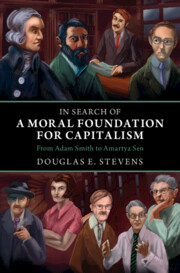Book contents
- In Search of a Moral Foundation for Capitalism
- In Search of a Moral Foundation for Capitalism
- Copyright page
- Dedication
- Contents
- Preface
- Acknowledgments
- 1 Introduction
- 2 The Moral Economist
- 3 Religion as a Moral Foundation
- 4 Humanism as a Moral Foundation
- 5 Self-Interest as a Moral Foundation
- 6 Neoclassical Economists Join the Search
- 7 Rescuing Capitalism from the Capitalists
- 8 The Promise of Capitalism
- References
- Index
3 - Religion as a Moral Foundation
Max Weber and R. H. Tawney
Published online by Cambridge University Press: 23 November 2023
- In Search of a Moral Foundation for Capitalism
- In Search of a Moral Foundation for Capitalism
- Copyright page
- Dedication
- Contents
- Preface
- Acknowledgments
- 1 Introduction
- 2 The Moral Economist
- 3 Religion as a Moral Foundation
- 4 Humanism as a Moral Foundation
- 5 Self-Interest as a Moral Foundation
- 6 Neoclassical Economists Join the Search
- 7 Rescuing Capitalism from the Capitalists
- 8 The Promise of Capitalism
- References
- Index
Summary
In Chapter 3, I address religion as a moral foundation for capitalism by discussing the lives and writings of Max Weber and R. H. Tawney. Classical economists after J. S. Mill limited the motivations of economic man to narrow self-interest and increased the mathematical formalism of their discipline, which tied their hands in arguing for capitalism. I begin by discussing the narrowing of arguments for capitalism in the nineteenth century by classical economists and the resistance to this narrowing by historical economists in Germany. Next, I discuss Max Weber and his broad critique of capitalism which included important social and moral issues as well as economic considerations. Given their opposing views, I contrast Weber’s critique of capitalism with that of Karl Marx. I then discuss the British economist R. H. Tawney and his critique of capitalism as a devout Christian on the political left. Tawney’s attempts to address the social injustices of the British industrial revolution led him to support the British Labour Party, but he rejected Marx’s anti-religious views and his emphasis on class division. This sets up a discussion of the role of religion in the development of capitalism based on Weber and Tawney’s two seminal works.
Keywords
- Type
- Chapter
- Information
- In Search of a Moral Foundation for CapitalismFrom Adam Smith to Amartya Sen, pp. 43 - 67Publisher: Cambridge University PressPrint publication year: 2023

